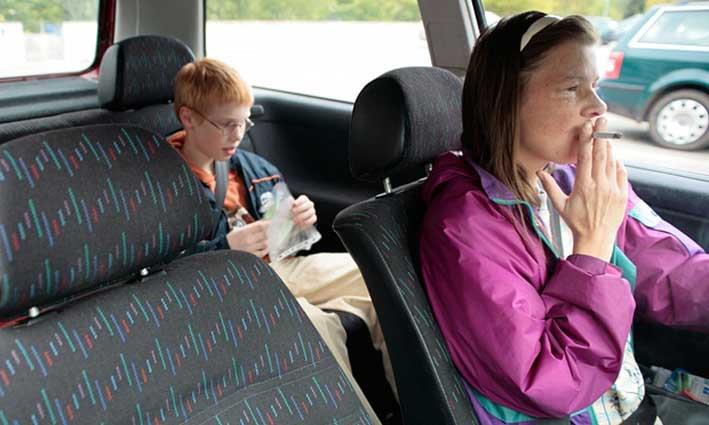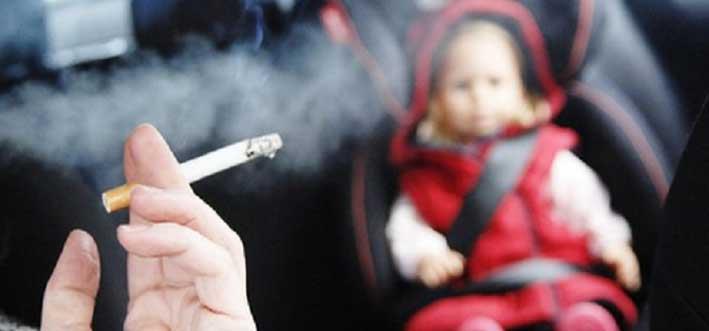Legislation banning smoking in cars when children are inside will come into force in the United Kingdom on 1 October, sparking a debate on whether a similar practice should be introduced in other countries, including Malta.
The government seems to be keeping back from entering the discussion, with the Health Ministry declining to comment, but the University Deputy Dean of the Faculty of Medicine and Surgery said he would agree with such a law, saying that in an enclosed space there is a stronger chance that children are negatively affected by second-hand smoke.
The Health Promotion and Disease Prevention Directorate has issued an informative poster on the risks associated with exposure to second-hand smoke for children, but medical professionals insist that more should be done to protect children.
The UK ban does not just apply to parents, but to any individual carrying minors in a vehicle. Exceptions have been made for individuals driving alone, as well as individuals travelling in cars with minors, where the car in question is convertible and has the top down. Individuals found to be in violation of this ban may be subject to a £50 fine.

Numerous studies have been carried out on the effects of exposure to second hand smoke on minors in vehicles. Studies carried out were done so in various countries such as England, Ireland, America, Canada and Australia.
Professor Stephen Montefort, Deputy Dean of the Faculty of Medicine and Surgery and the University of Malta, confirmed that child exposure to second hand smoke in vehicles leads to increased adverse health effects, stating that this was because it is an enclosed space with close proximity, therefore the susceptibility to certain ailments increases.
Professor Montefort added that local studies have been conducted on the association between tobacco exposure and children, and it was found that parents who smoke have a higher chance of wheezing and rhinitis, which refers to irritation and inflammation of the mucous membrane inside the nose. In addition to this, mothers who smoked in the first year of their child’s life had the largest negative effect on the child’s health, more so than if it is the father who smoked during the first year of a child’s life. Therefore, with this link established, one would have a hard time arguing that second hand smoke exposure in vehicles does not lead to an increased susceptibility to certain respiratory ailments.
In a research paper published by Addictive Behaviours – an international journal, experts argued that a ban on smoking in cars carrying children is ethically justifiable, on the bases that children are not fully autonomous and are subject to the whims of their guardians. Children are unable to protect their own interests; therefore it is up to the government to submit measures that protects their interests.

In an article published by this newsroom last year, retired traffic expert Joe Micallef Stafrace said that the idea of banning smoking in cars carrying minors is a compelling one, as well as irrefutable. This is due to the need to safeguard the health and safety of children.
Professor Montefort agreed, stating that “government has to protect children”. He went on to say that he “totally agree[s]” with a government ban on smoking in vehicles carrying minors in Malta.
The European Respiratory journal published a study, where it was found that there was a tendency towards increased chances of both respiratory and allergic symptoms when exposed to second hand smoke in vehicles. In addition to this, the study also found that the likelihood of contracting a wheeze or hay fever symptoms was significantly higher than those not exposed to second hand smoke in vehicles, whereas it was found that there was not an increased tendency towards bronchitis symptoms and asthma. This particular study stressed the importance of conducting cross population studies in order to make meaningful comparisons, due to the fact that the children analysed were all Irish.

A report of the Tobacco Advisory Group of the Royal College of Physicians said that exposure to second hand smoke in children increases the likelihood of cot death, glue ear (common childhood condition where the middle ear fills up with mucus), asthma and other respiratory diseases. In addition to this, a review by the British Medical Association’s Board of Science concluded that there is no safe level of exposure to tobacco smoke for children, negative effects may be found even at low levels of exposure.
In a study published by the Medical Journal of Australia, children exposed to second hand smoke in vehicles were twice as likely to contract a persistent wheeze compared to children who are not exposed. A Canadian study, analyzing the effects of second hand smoke exposure in both homes and cars found that there was a strong link between exposure and chronic bronchitis in 12-19 year-old persons in both instances.